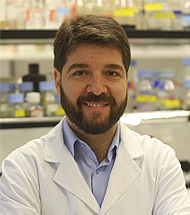Silvestre Vicent, PhD, has received the IASLC Lung Cancer Young Investigator Award for 2015-2016
The University of Navarra CIMA researcher is the only Spanish scientist to have earned this award, which rewards scientific excellence in his specialty.

Pamplona, February 5. Dr. Silvestre Vicent, a scientist at the Center for Advanced Medical Research (CIMA) at the University of Navarra, has been awarded the 2015-2016 grant as a young European researcher by the International Association for the Study of Lung Cancer (IASLC). He is the only Spaniard selected this year, when nine grants of $40,000 were awarded to researchers from the United States, Spain, France, Italy, Australia and Japan. The IASLC grant rewards scientific excellence in lung cancer research and promotes the development of research lines on clinical innovation and prevention in this specialty.
With a PhD in Histology from the University of Navarra, Dr. Vicent carried out a six-year postdoctoral stage at Stanford University (USA) on the functional genomics of cancer. In 2012 he joined the CIMA Research Program into Solid Tumors and Biomarkers. His special field of interest is the identification of genes which may be potential therapeutic targets.
New therapeutic strategies for lung cancerApproximately 3 million new cancer cases are diagnosed in Europe every year. Over 95% are solid tumors and, of these, one in four are tumors originating in the respiratory system (mainly lung cancer).
About 25% of lung cancer patients show mutations in the KRAS gene, the oncogene which most frequently mutates in cancer, which to date remains "undruggable". "Since its discovery 40 years ago, no treatment has been found which can attack this oncogene. The identification of new molecular markers in mutated KRAS tumors may allow us to develop innovative therapeutic strategies to deal with these tumors. In CIMA we are using laboratory-generated data to predict drugs that are already under clinical trial and may work on mutated KRAS tumors. If we can confirm that they affect such tumors, the drug will be developed more quickly and will reach the patient faster", Dr. Vicent explained.
